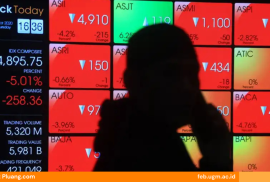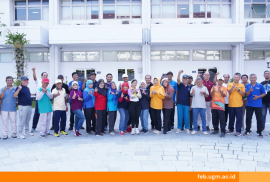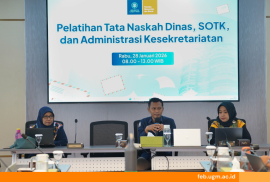Nowadays, accountants are increasingly needed in every business line considering each entity manages funds and requires a variety of financial information. Companies, government agencies, and even community organizations are required to attract competent individuals in the field of accounting to produce reliable and relevant accounting information. The urgency of early learning about the world of accounting encourages Ikatan Akuntan Indonesia (IAI) Yogyakarta together with Information Systems Discussion Forum – IAI Compartment of Accountant Educators and Professional Education Accountants at the Faculty of Economics and Business, Universitas Gadjah Mada (FEB UGM), Accounting Education Center – Laboratory Laboratory Accounting FEB UGM held a Workshop entitled “High School Accounting Learning Innovation” on July 23rd. The activity held at Pertamina Tower Building 5th Floor Room P.5.4 (IT Corner) FEB UGM is a manifestation of the social care of higher education institutions and professions to actively participate in the development of accounting in Indonesia.
In the event, Prof. Dr. Slamet Sugiri discussed the development of the accounting profession and the learning challenges of accounting subjects. Slamet explained the development of the accounting profession which is now able to provide 97 percent of employment opportunities. Regarding the accounting records of MSMEs, IAI publishes Micro Small and Medium Enterprises Financial Accounting Standards (SAK EMKM), which are financial statements specifically designed as a benchmark for financial accounting standards for MSMEs. This EMKM financial report contributes greatly to the decision-making process, financing from the banking industry, accountability, and tax reporting attachments. The minimum financial statements include the Financial Position Report at the end of the period, the Profit and Loss Statement during the period, as well as Notes to the Financial Statements.
Along with the times, EMKM has several stumbling blocks, such as difficulties in accessing funding sources (banking), is more dependent on one type of product, inadequate budget control system, and lack of new technology and equipment. In response to this, the Internet of Things (IoT) can be one of the solutions that EMKM actors can look into in marketing their products, for example through shops, marketing, and payments based online. Cloud computing can also be adopted in the EMKM system so that companies do not need to make or buy accounting software. Besides, cloud computing can make it easier for accountants to record business transactions and allow owners to access financial reports in real-time.
This raises a new challenge in accounting learning. Moreover, the role of accountants in the recording will be replaced by Artificial Intelligence (AI). Therefore, accounting learning must be able to integrate these issues into learning material. In other words, schools must be able to integrate education with industrial needs. The learning revolution can be done by cooperating with national and international industries, the practice of making applications for the preparation of simple financial reports, debriefing, learning that trains soft skills, as well as certificates of supporting expertise. With this provision, graduates are expected to be ready to contribute as independent and modern EMKM actors.
The event also discussed the 4.0 era accounting learning delivered by Sukirno D.S. With the development of increasingly massive information technology, demanding someone has the competence to work, entrepreneurship, collaborate, and communicate with digital technology. The industrial revolution 4.0 brought educational challenges ranging from uneven access to education to the ability to integrate internet and information with industry lines that were still low. Therefore, the curriculum in the form of education 4.0 is considered able to move dynamically according to the needs of the times. Through this system, information technology and the internet can be accessed by anyone and anywhere, investment in human resources must be prioritized, universities can be used as a basis for technological development, as well as international collaboration.
Source: Leila Chanifah Zuhri/Sony Budiarso




